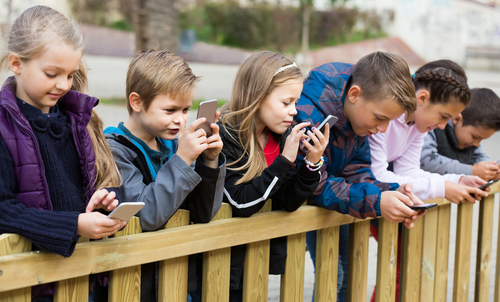My college roommate has a childhood memory that represents simplicity at its best — one that is not likely to be repeated with his own children.
It’s the 1970’s. My friend is waiting in a hot car with the windows down, while his Mexican immigrant parents work in the fields of the San Joaquin Valley. All he had to entertain himself is a stack of baseball trading cards. He plays with them for hours.
My friend is now a successful lawyer living a comfortable life in Beverly Hills. He has a smart and beautiful wife, and two adorable twin sons.
And, by now, he has given up all hope that his boys will ever be able to entertain themselves for any substantial period of time with anything that doesn’t have an on-and-off switch.
Like many of us who parent young children in the digital age, my friend is fighting a losing battle as he tries with little success to get his kids to put down their electronics — iPhone, tablet, video games, etc. — and pick up a book or just go outside.
It’s misery. And, as they say, misery loves company.
I have another friend who is a career educator, and he recently gave me a ride to the airport — bringing along his 12-year-old daughter. She was a sweet girl, albeit a tad quiet as she tapped on her smart phone. When I told my friend how I enjoyed meeting his daughter, he chuckled. Referring to the fact that she was so shy, he lifted his hands and wiggled his thumbs.
“This is what she likes to do,” he said in a frustrating tone.
My cousin and his wife are both educators, and they have two well-behaved boys. One of them, they assured me, would play video games for 12 hours straight until he passed out if they let him.
According to a recent study, kids and teens age 8 to 18 spend an average of more than seven hours a day looking at screens.
I believe it. Everywhere I look — post office, supermarket, swim class, Little League games, etc. — I see more and more parent warriors fighting a lost cause.
I’m right there with them. It’s not unusual to walk into our family living room and see my 13-year-old daughter, 11-year-old son, and 9-year-old daughter sitting quietly, not talking to one another, because they’re poking away at their devices. And when they’re on their electronics, it seems they don’t hear, listen, or concentrate on anything that doesn’t fit onto that tiny screen.
I don’t know how we got here. It likely had something to do with that first time I handed one of my kids my phone to entertain them. They were probably young at the time, too young. Chalk this up to a parental failure. Not my first or last.
Or maybe it’s because they see my wife and I — their mom and dad — at our laptops, or picking away at our phones.
The real problem is that, when it comes to their screen time, my kids find it almost impossible to self-regulate. They don’t know when to stop, put down their device, and walk away.
And when my wife and I do occasionally manage to chalk up a victory and they put down their little best friends, my kids get angry, moody, grumpy and mean.
These are the same withdrawal symptoms I display when I miss my morning cup of coffee. And I’m addicted to caffeine.
Which makes me wonder: Are my kids — and those of many other people — addicted to their electronic devices? And what long-term harm is being done to them because of this habit?
Some of the early research is in, and the news is not good.
A 2015 report by the Pew Research Center found that most teens today own a smartphone and go online every day, and about a quarter of them use the Internet "almost constantly."
A 2016 study suggested that teens who had greater exposure to social media were likely to be diagnosed with depression.
A 2018 study suggested that adolescents that frequently use digital media might have a greater chance of developing symptoms of attention deficit hyperactivity disorder.
And most recently, the American Heart Association warned that children have way too much screen time and this may actually be hurting their health by promoting a sedentary lifestyle which often contributes to ailments like obesity.
I think most parents know that too much screen time is hurting their kids. So why don’t we do something about it?
Parents are hardwired to protect their children from dangerous behavior — from drinking to drug use to premarital sex. We draw the line and say that somethings are off-limits.
When will we draw that line in our own homes and turn off their electronic devices?
Ruben Navarrette is a contributing editor to Angelus and a syndicated columnist with the Washington Post Writers Group and a columnist for the Daily Beast. He is a radio host, a frequent guest analyst on cable news, and member of the USA Today Board of Contributors and host of the podcast “Navarrette Nation.” Among his books are “A Darker Shade of Crimson: Odyssey of a Harvard Chicano.”
Start your day with Always Forward, our award-winning e-newsletter. Get this smart, handpicked selection of the day’s top news, analysis and opinion, delivered to your inbox. Sign up absolutely free today!

